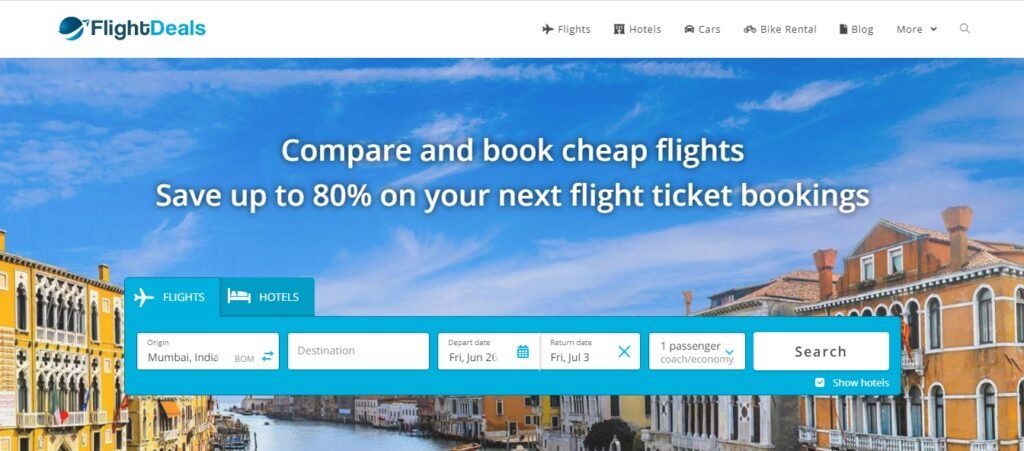Introduction
In the ever-evolving landscape of online commerce, the acquisition of a travel website marks the beginning of a journey filled with opportunities and challenges. As an on-page SEO expert in a leading company specializing in organic traffic generation, I embark on a quest to unravel the intricacies of marketing strategies for a newly purchased travel site. This comprehensive guide aims to empower businesses with the knowledge and strategies needed to maximize the potential of their digital asset. We seamlessly integrate an exciting promotion—a chance to explore a travel website available for acquisition on Sitefy, a trusted platform for digital asset transactions.
The Essence of Marketing for a Newly Purchased Travel Site
1. Strategic Positioning:
Marketing for a newly acquired travel site goes beyond promotional efforts; it’s about strategically positioning the site in a competitive landscape. This involves understanding the target audience, identifying unique selling points, and crafting a compelling brand narrative.
2. Building Trust:
Trust is the currency of online business. Establishing trust is crucial for a newly acquired travel site. Marketing strategies should focus on transparency, reliability, and delivering value to build trust among users and stakeholders.
3. User-Centric Approach:
A user-centric approach is paramount. Marketing efforts should align with the needs, preferences, and expectations of the target audience. Understanding user behavior and tailoring strategies accordingly enhances the effectiveness of marketing campaigns.
Key Components of Marketing Strategies
1. Targeted Content Marketing:
Craft targeted content that resonates with the audience. Develop blog posts, articles, and multimedia content that not only showcase the travel site’s offerings but also provide valuable information, tips, and insights relevant to the target audience.
2. Social Media Engagement:
Leverage the power of social media. Develop a strong social media presence on platforms relevant to the travel niche. Engage with the audience through visually appealing content, travel stories, and interactive posts to build a community around the brand.
3. Influencer Collaborations:
Explore influencer collaborations. Partnering with travel influencers can amplify the reach of the travel site. Influencers bring authenticity, and their recommendations can have a significant impact on the site’s credibility and visibility.
4. Email Marketing Campaigns:
Implement targeted email marketing campaigns. Build and nurture an email list to connect with potential customers. Email campaigns can include newsletters, exclusive offers, and personalized content to keep the audience engaged.
5. Search Engine Optimization (SEO):
Integrate a robust SEO strategy. As an on-page SEO expert, this is a key area of expertise. Optimize the site’s content, meta tags, and overall structure to ensure high visibility on search engines, driving organic traffic to the travel site.
6. Paid Advertising:
Consider strategic paid advertising. Invest in targeted online advertising campaigns to reach a broader audience. Platforms like Google Ads and social media advertising can provide instant visibility and drive traffic to the travel site.
7. Affiliate Marketing Programs:
Explore affiliate marketing programs. Establish partnerships with affiliates who can promote the travel site in exchange for commissions. This not only expands the site’s reach but also provides a cost-effective marketing approach.
The SEO Expert’s Role in Marketing Strategies
As an on-page SEO expert, my role in marketing strategies for a newly purchased travel site is pivotal. Here’s how SEO expertise complements the process:
1. Keyword-Driven Content Creation:
Drive content creation with strategic keyword research. Identify high-impact keywords in the travel niche and seamlessly integrate them into the content to enhance search engine visibility and attract organic traffic.
2. Technical SEO Optimization:
Conduct technical SEO optimization. Ensure that the travel site’s technical aspects, including site speed, mobile responsiveness, and structured data, align with SEO best practices to improve user experience and search rankings.
3. Backlink Building Strategies:
Develop backlink building strategies. Cultivate high-quality backlinks from authoritative sources in the travel industry to enhance the site’s authority and credibility in the eyes of search engines.
4. Monitoring and Analytics:
Utilize monitoring and analytics tools. Regularly track key performance metrics, including organic traffic, keyword rankings, and user engagement, to assess the effectiveness of marketing strategies and make data-driven adjustments.
5. Competitor Analysis:
Conduct competitor analysis for SEO insights. Analyzing competitors’ strategies provides valuable data for refining marketing approaches, identifying opportunities, and staying ahead in the competitive travel niche.
Embedding Promotion: Introducing Sitefy’s Travel Website for Sale
In the pursuit of effective marketing and exploring opportunities, we introduce an exciting promotion with the integration of Sitefy’s travel website available for acquisition.
Sitefy’s Travel Website for Sale
Key Features:
- Proven Revenue Streams: Benefit from established partnerships and revenue-generating mechanisms that guarantee immediate returns.
- Optimized for Organic Traffic: Leverage the power of a well-optimized website that attracts organic traffic through strategic SEO practices.
- Diverse Income Streams: Enjoy the advantage of multiple income streams, including commissions from bookings, display ads, and sponsored content.
- Scalability and Growth: Strategically positioned for scalability, this website offers growth opportunities as it gains authority and attracts more organic traffic.
Why Choose Sitefy:
- Trusted Transactions: Sitefy ensures secure and transparent transactions, providing a trustworthy platform for digital asset acquisitions.
- Comprehensive Due Diligence: Our vetting process guarantees that you receive accurate information about the website’s traffic sources, content quality, and revenue claims.
- Expert Guidance: Benefit from expert guidance throughout the acquisition process, making your journey into the travel affiliate industry a smooth and informed experience.
Strategies for Effective Marketing
1. Consistent Branding Across Platforms:
Maintain consistent branding. Ensure that the travel site’s branding, messaging, and visuals are consistent across all marketing channels, including the website, social media, and advertising materials.
2. Data-Driven Decision-Making:
Base marketing decisions on data. Utilize analytics tools to gather insights into user behavior, campaign performance, and market trends. Data-driven decision-making ensures targeted and effective marketing strategies.
3. Community Engagement:
Build a community around the travel site. Engage with the audience through social media, forums, and online communities. Foster a sense of belonging and loyalty, turning users into brand advocates.
4. Strategic Partnerships:
Form strategic partnerships. Collaborate with other businesses in the travel industry, such as hotels, airlines, or tour operators, to cross-promote and expand the reach of the travel site.
5. Localized Marketing:
Implement localized marketing strategies. Tailor marketing efforts to specific regions or target markets. Consider cultural nuances, language preferences, and local trends to resonate with diverse audiences.
6. User-Generated Content Campaigns:
Encourage user-generated content. Run campaigns that incentivize users to share their travel experiences, photos, and reviews. User-generated content adds authenticity and fosters a sense of community.
Overcoming Common Challenges in Marketing
1. Competitive Landscape Navigation:
Navigate the competitive landscape strategically. Identify unique selling propositions and leverage them in marketing materials to stand out in a crowded market.
2. Adapting to Industry Trends:
Stay abreast of industry trends. The travel industry is dynamic, with trends evolving rapidly. Adapting marketing strategies to align with current trends ensures relevance and engagement.
3. Balancing Paid and Organic Strategies:
Strike a balance between paid and organic strategies. While paid advertising provides immediate visibility, organic strategies, including SEO, contribute to long-term sustainability. A well-balanced approach ensures a comprehensive marketing mix.
4. Crisis Management Preparedness:
Be prepared for crisis management. Unforeseen events, such as global crises or negative publicity, can impact a travel site’s reputation. Having a crisis management plan in place helps mitigate potential damage.
5. Measuring Return on Investment (ROI):
Efficiently measure ROI. Utilize tracking tools to assess the impact of marketing campaigns on key performance indicators (KPIs) such as conversions, revenue, and user engagement. Measuring ROI guides future marketing investments.
The Role of SEO in Ensuring Marketing Success
1. SEO as a Foundation:
Position SEO as the foundation of marketing success. A well-optimized travel site lays the groundwork for effective marketing by ensuring visibility on search engines, attracting organic traffic, and enhancing user experience.
2. Continuous SEO Adaptation:
Adapt SEO strategies continuously. The travel industry and online landscape evolve, requiring ongoing adjustments to SEO strategies. A proactive approach to SEO adaptation ensures the site remains competitive and visible.
3. SEO for Brand Authority:
Leverage SEO for brand authority. A site that consistently ranks high on search engines establishes itself as an authoritative source in the travel niche, contributing to user trust and brand credibility.
4. Aligning SEO with Marketing Goals:
Align SEO efforts with marketing goals. Ensure that SEO strategies support overarching marketing objectives, whether it’s increasing brand awareness, driving conversions, or expanding the site’s reach.
Conclusion
Marketing strategies for a newly purchased travel site are not just about attracting attention—they’re about crafting a narrative, building trust, and establishing a brand presence in the competitive online space. As an on-page SEO expert, my role in this journey is to ensure that marketing efforts seamlessly align with SEO best practices, user expectations, and the overarching goals of the travel site.
By combining the power of SEO expertise with a comprehensive understanding of marketing strategies, businesses can unlock the full potential of their newly acquired travel websites. The integration of Sitefy’s travel website promotion adds an extra layer of opportunity, providing readers with a valuable resource to explore and potentially initiate their journey into the world of online business acquisitions.
In the dynamic realm of digital success, effective marketing is the wind in the sails that propels a travel site toward sustained growth and recognition. It’s not just about promoting services; it’s about creating an experience, fostering connections, and guiding users on a journey that transcends the boundaries of a transaction.



